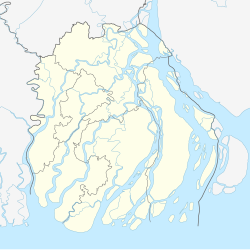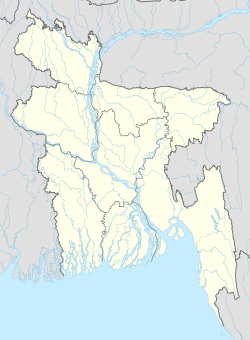|
Barguna
Barguna (Bengali: বরগুনা) is a town in Barguna district in southern Bangladesh. It is the administrative headquarter and the largest town of Barguna district and a part of Barisal Division. Located on the bank of Khakdon river, the town covers an area of 15.57 square kilometres (6.01 sq mi) with a population of 32,235, as of the 2011 census.[1][2] HistoryEtymologyThere are different opinions about the origin of the name "Barguna". The general belief is that the name is derived from Bengali name "Baragun" meaning high tide. The remote past wood traders from the northern region had to wait here for Baragun (high tide) to pull their boats against strong current of the Khakdon river. While others say, Barguna was named after an eminent Magh people who settled there at the very beginning of the habitation. As to the concept of history and folk, Barguna was named the official name likely in 1871, through the creation of a Patuakhali subdivision under then Bakerganj District (present Barisal). Mughal periodHistorians found that in the thirteenth century there was no trace of plantation in the region. The entire region was then full of jungle and along the riverside in Sundarbans. However, in the early fourteenth century, people started settling here for cultivation. It was then a part of Bakla-Chandradwip kingdom. The inhabitants of the region faced repeated attacks from the Maghs and Portuguese pirates. Umed Khan son of Shaista Khan saved the inhabitants from the Maghs repression and established the absolute authority of the emperor Aurangzeb. The emperor was pleased with him and awarded him to rule the state of Bakla-Chandradwip which Barguna was part of it. It is said that during the reign of Nawab Ali Vardi Khan, a group of Rakhine people settled permanently in Baliatoli near the present town, clearing the bushes and jungles and starting cultivation there. British periodBarguna was a resumed Sundarbans estate almost entirely reclaimed from forest. It was resumed by an order of the Presidency Commissioner dated the 25 July 1856. It was claimed by the Nawab of Dacca as belonging to Aila-Fuljhuri, but was ultimately decreed to Government by the Privy Council in 1870. It was the key to the Sundarbans and was the healthiest of the Sundarbans estates. There was a Khas Mahal Tashil cutchari under the supervision of a Sub-Deputy Collector (Circle Officer).[3] Barguna thana (police station) was established in 1904 and became the first administrative unit of the town. With the influx of population from the districts of Dhaka, Faridpur and Barisal a good market, a middle English school, a post office and a charitable dispensary were gradually established and trading firms opened up business.[3] Present historyBarguna was elevated to a sub-division in 1969 during the formation of Patuakhali district during Pakistan period. After the independence, the sub-division was upgraded to a district in 1984 and Barguna became the headquarter of Barguna district.[4] DemographicsAt the time of the 2011 census, Barguna had 7,353 households and a population of 32,235. Barguna has a literacy rate of 75.90% and a sex ratio of 931 females per 1000 males.[5] Points of interest
SportsCricket and football are the two most popular sports in Barguna while local games like Kabaddi, Kho kho, Lathi Khela are also popular. There is a local stadium in the town known as Barguna District Stadium. It is used for hosting local sports and national events. Administration  Barguna municipality was established on 23 July 1973. The municipality is administrated by 9 councilors, 3 woman councilors and the mayor elected by the local government election which sits in the office for a five-year tenure. Transport and communicationsThe main transport systems used in the town are cycle, rickshaws, auto rickshaws, buses, micro-buses and cars. Barguna can be reached by road and waterways. There is a bus station and a launch terminal in the town which maintains communication with the other districts of the country. There is no railway in this region. EducationBarguna town is a home to many educational institutions. Barguna Zilla School is the oldest school in the town established in 1927 as Barguna Middle English School by Mr. Ramzan Ali Akon.[6] Notable schools and colleges include Barguna Government College, Barguna Government Women's College, Barguna Zilla School, Barguna Govt. Girls High School, Gourichanna Nawab Salimullah Secondary School etc. Besides these, there are two teacher training colleges, a Government Polytechnic institute, a technical school and college and a textile vocational institute in the town. The educational activities are operated under the Board of Intermediate and Secondary Education, Barisal. MediaPrint media: Prothom Alo (National), The Daily Kaler kantho (National), Daily Samakal (National), Dainik News (National) Telecommunications: Teletalk, Airtel, BTCL, BanglaLink, Grameen Phone, Robi etc. References
External links |
||||||||||||||||||||||||||||||


